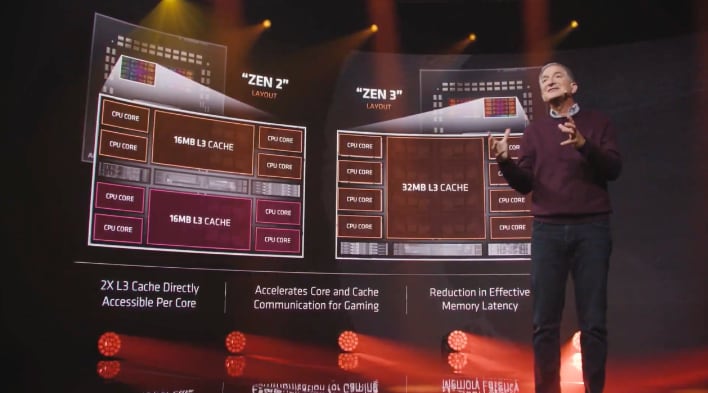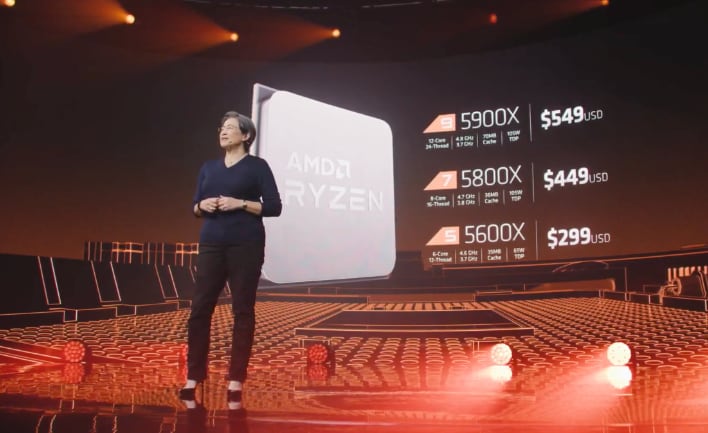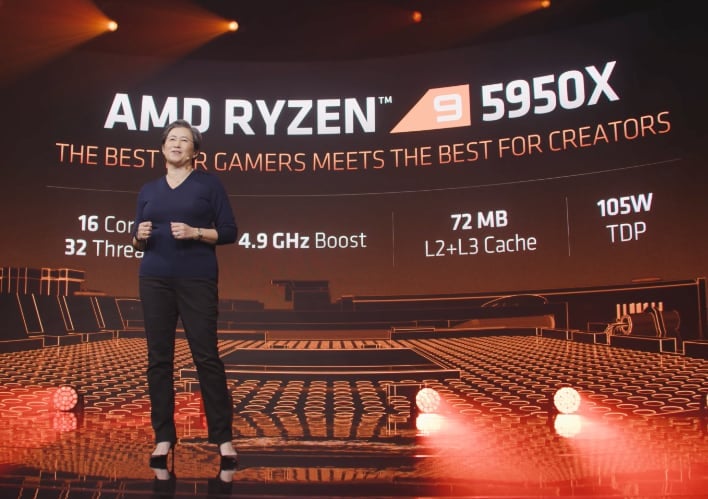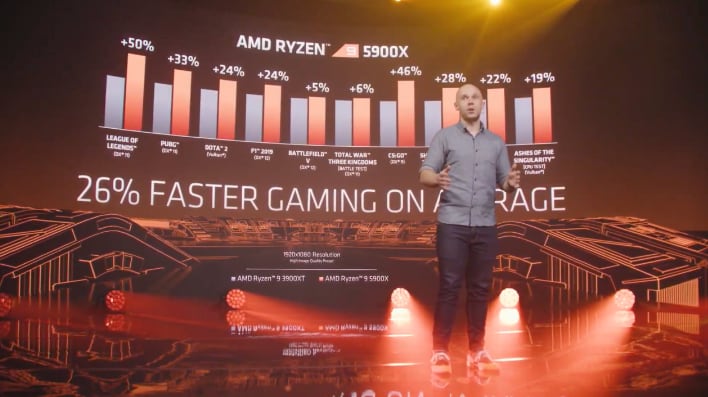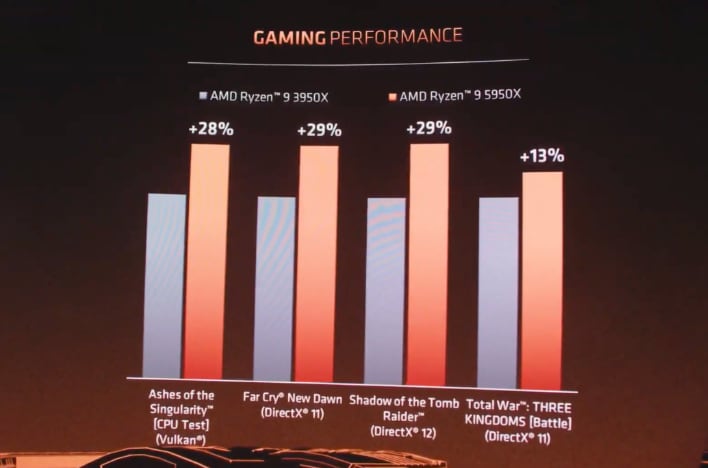AMD Unveils Ryzen 5000 Series With Up To 16 Cores, A Huge IPC Uplift And Gaming Leadership
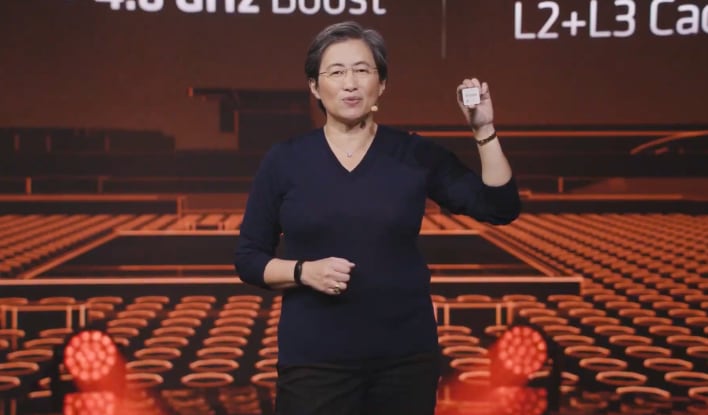
AMD Is Skipping Ryzen 4000 And Going Straight To Ryzen 5000 For Desktops
But before we get into the details, we first need to talk about model naming; specifically, Ryzen 5000. Conventional wisdom would dictate that the next generation of AMD’s consumer desktop processors would be called Ryzen 4000, considering that Ryzen 3000 CPUs were released last year. However, AMD has been "off track" so to speak with its CPUs and APUs, as the latter have been one series ahead. For example, this is how AMD's Ryzen-based processors have been classified thus far:
- Ryzen 1000 series on desktop: Zen (14nm)
- Ryzen 2000 series APUs (desktop and mobile): Zen (14nm)
- Ryzen 2000 series on desktop: Zen+ (12nm)
- Ryzen 3000 series APUs (desktop and mobile): Zen+ (12nm)
- Ryzen 3000 series on desktop: Zen 2 (7nm)
- Ryzen 4000 series APUs (desktop and mobile): Zen 2 (7nm)
For this launch, AMD is looking to align APU and CPU branding, so Zen 3 APUs and CPUs will both adopt Ryzen 5000 branding. This should hopefully reduce a lot of confusion going forward, and we applaud this decision.
Ryzen 5000’s Zen 3 Heart Is A Performance Monster
AMD is going for outright desktop processor dominance with Zen 3 architecture, and the company is promising that it will lead in both multi- and single-threaded performance. Yes, you heard that right. AMD has long been a multi-threaded performance leader with its Zen architectures, but Intel has still held a slight single-threaded advantage, which it has touted in gaming benchmarks. Now, AMD says that it will outpace Intel in single-threaded performance as well, which will be critical in taking the lead across an even broader range of applications (and not just for games).
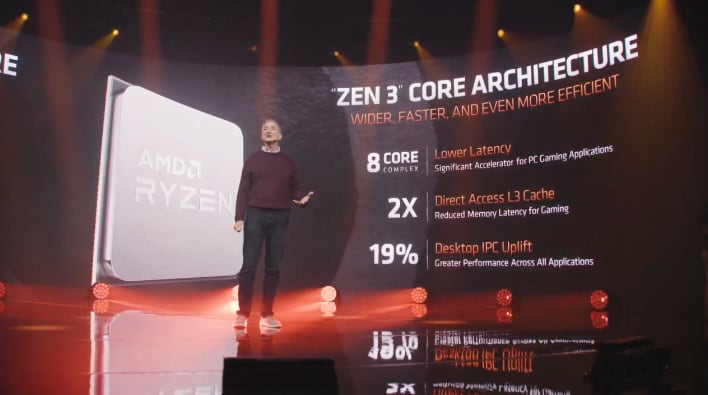
Getting down to actual numbers, AMD says that there will be a staggering 19 percent uplift in instructions per clock (IPC) compared to Zen 2. If you recall, Zen 2 already provided a 15 percent IPC uplift over the preceding Zen+ architecture.
Zen 3 is employing a unified 8-core CCX design, which is key to the IPC gains. Zen 2 used an 8-core CCX with two 4-core groupings, each with access to 16MB L3 cache. With Zen 3's unified 8-core CCX is no longer split into two groups, and each core shares a single, large 32MB pool of unified L3 cache. So, in lightly threaded applications and gaming, all CCXs will be able to access cache with lower latency and up to twice the amount of contiguous L3 cache, compared to previous generation Ryzen 3000 processors. Couple this with a wider issue Float and Int engines, along with "zero bubble" branch prediction, and Ryzen 5000 is shaping up to be another performance king AMD.
AMD Has Four Ryzen 5000 SKUs Lined-Up, All Launching November 5th With Huge Performance Gains
At the bottom of the stack is the Ryzen 5 5600X, which will replace the Ryzen 5 3600X. It's a 6-core/12-thread processor with base/boost clocks of 3.7GHz and 4.6GHz respectively, 35MB of L2+L3 cache, and a 65W TDP. The Ryzen 7 5800X steps that up to 8 cores/16 threads with base/boost cocks of 3.8GHz/4.7GHz, 36MB of total cache and a 105W TDP. And the 12-core/24-thread Ryzen 9 5900X has base/boost clocks of 3.7GHz and 4.8GHz, 70MB total cache, and a 105W TDP. AMD Ryzen 5 5600X, Ryzen 7 5800X, and Ryzen 9 5900X will be priced at $299, $449, and $549 respectively.
At the top of the stack, however, is the big and burly Ryzen 9 5950X with its 16 cores and 32 threads. AMD is promising a 4.9GHz boost clock and 72MB L2+L3 cache while still maintaining an reasonable 105W TDP. The Ryzen 9 5950X will be priced at $799. All four processors are launching at the same time: November 5th.
Compared to the Ryzen 9 3900X, AMD says that the Ryzen 9 5900X is on average 26 percent faster in popular games, including a 50 percent uplift in League of Legends. The Ryzen 9 5950X delivers upwards of a 29 percent performance gain compared to its Ryzen 9 3950X predecessors in games like Far Cry New Dawn and Shadow of the Tomb Raider. Needless to say, all of these new Ryzen 5000 series processors are going to far outpace their predecessors, and AMD is apparently committed to taking the performance crown away from Intel in nearly every scenario.
If this all pans out as AMD claims, the company will have quite a while to crow about its projected performance advantages, because Intel's 11th generation Rocket Lake-S desktop processor family isn't arriving until Q1 2021 (potentially with a March 2021 launch).

